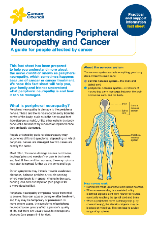- Home
- Cancer Information
- Managing side effects
- Peripheral neuropathy
- Key questions
Key questions about peripheral neuropathy
Learn the answers to these key questions about peripheral neuropathy:
- What causes this nerve damage?
- How common is peripheral neuropathy after chemotherapy?
- Will it get better?
- Can it be prevented?
Listen to our podcast on Coping with a Cancer Diagnosis
What causes this nerve damage?
Some types of chemotherapy that are used to treat cancer can damage peripheral nerves. If this side effect occurs, you may hear it called chemotherapy-induced peripheral neuropathy (CIPN). Sometimes, other cancer treatments and the cancer itself can cause peripheral neuropathy.
Possible cancer-related causes of peripheral neuropathy include:
- certain chemotherapy drugs, particularly taxanes (e.g. docetaxel, paclitaxel), platinum drugs (e.g. carboplatin, cisplatin, oxaliplatin) and vinca alkaloids (e.g. vincristine)
- some other cancer drugs, such as thalidomide, bortezomib and brentuximab vedotin
- some types of cancer, especially lung cancer, myeloma and lymphoma
- tumours pressing on nerves
- bones breaking down and causing swelling that presses on nerves
- surgery or radiation therapy damaging nerves.
It’s not just cancer that causes peripheral neuropathy. Other factors that may damage nerves include diabetes, shingles, heavy use of alcohol and other drugs, and a lack of certain vitamins and minerals (especially vitamin B). These factors may also increase your risk of having peripheral neuropathy after a cancer diagnosis. Smoking is another factor that can increase the risk.
How common is peripheral neuropathy after chemotherapy?
The main cause of peripheral neuropathy in people affected by cancer is treatment with certain chemotherapy drugs. For these types of chemotherapy, about 7 out of 10 people will experience some symptoms one month after treatment, and 3 out of 10 people will still have symptoms six months after treatment. The risk differs between different chemotherapy drugs.
Will it get better?
Some types of chemotherapy cause short (acute) episodes of peripheral neuropathy during or shortly after the cancer treatment session. These episodes tend to last a few days.
For other types of chemotherapy, peripheral neuropathy may be longer-lasting (chronic). It can start during treatment and is more likely to occur the more treatment cycles you have had. In some cases, peripheral neuropathy can develop or get worse over time, even after treatment has finished.
After the end of cancer treatment, peripheral neuropathy symptoms may begin to improve over 6–12 months.
In some people, symptoms are permanent and may be severe. This is more likely if you have had intensive treatment, such as high-dose chemotherapy, or if you have diabetes or other risk factors for peripheral neuropathy.
Can it be prevented?
So far, no treatment has been proven to prevent peripheral neuropathy. However, if you start having symptoms during chemotherapy treatment, your doctor may reduce the doses of chemotherapy drugs or give them to you further apart. This adjustment sometimes allows the nerves to recover and prevents permanent damage.
In some cases, you may need to stop having a particular chemotherapy drug. You can talk to your doctor about how they will balance the risk of changing the chemotherapy plan against the risk of the nerve damage becoming permanent.
Researchers are studying whether wearing ice mitts and ice booties during chemotherapy treatment could help prevent the cell damage that causes peripheral neuropathy. However, there is not yet enough evidence that this works. Talk to your treatment team for more information.
| Although there is no way to prevent peripheral neuropathy developing, you may be able to reduce your risk. If you have diabetes, it will be important to make sure the diabetes is well managed throughout your cancer treatment. Limiting how much alcohol you drink and not smoking may also lower the risk. |
More resources
Dr Susanna Park, IN FOCUS research program and Senior Lecturer, Brain and Mind Centre, Faculty of Medicine and Health, The University of Sydney, NSW; Katrina Dick, Consumer; Rosemerry Hodgkin, 13 11 20 Consultant, Cancer Council WA; Phil Mendoza-Jones, Consumer; Jodie Nixon, Clinical Team Leader, Occupational Therapy, Cancer Services, Princess Alexandra Hospital, QLD; Rachel Tunney, Consumer; Jane Turner, Senior Exercise Physiologist, Sydney Cancer Survivorship Centre, Concord Hospital, NSW; Dr Shirley Wong, Consultant Medical Oncologist, Sunshine Hospital, Western Health, VIC.
View the Cancer Council NSW editorial policy.
View all publications or call 13 11 20 for free printed copies.
Need to talk?
Support services
Life after cancer treatment
Programs and support for people who have finished treatment
Cancer Council Online Community
A community forum – a safe place to share stories, get tips and connect with people who understand
Cancer information
Chemotherapy
Learn about this common cancer treatment and managing its side effects
Staying healthy after treatment
Lifestyle changes that can help keep you in good health

